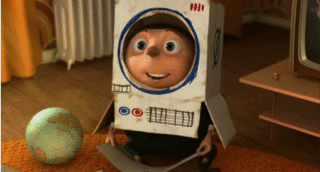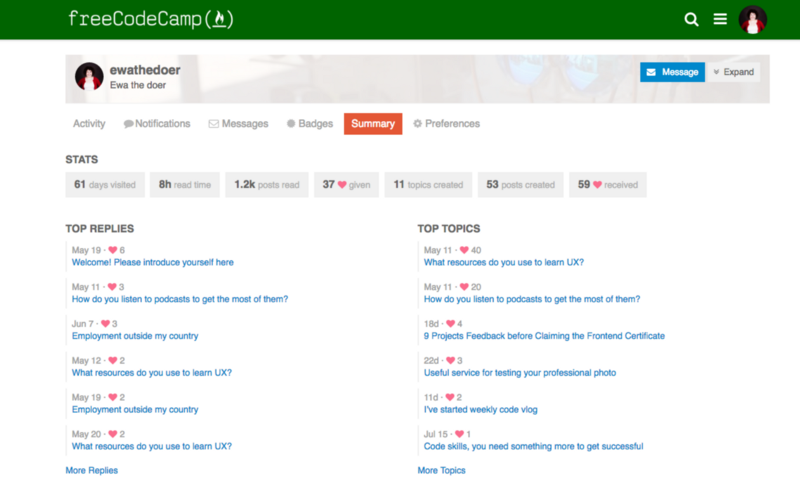by Ewa Mitulska-Wójcik
It takes a village to raise a coder

“It takes a village to raise a child.” — Swahili Proverb
This article is also available in Chinese.
In the six months since I joined Free Code Camp, I’ve…
- built 10 projects
- designed 6 CodePen pens
- built 4 GitHub repos (and 6 gists!)
- earned 454 brownie points
- written 3 Medium articles
- recorded a learning to code vlog
- spent weeks working through the algorithm scripting sections
- taken a single two-week break from coding
- participated in the 2016 New Coder survey
- established a local Free Code Camp group
- organized a local coffee-and-code event
- taken part in four tech meetups
- drank 148 mugs of coffee
- released tons of emotions
- and earned my front end development certificate!
When I set out on my journey, I knew that learning to code would be long, deliberate process. I’ve progressed step by step, poco a poco, po ciut ciut.
At first, I stayed within my comfort zone by working through short tutorials. I learned a few things, but was still unclear how I should put this new knowledge to use.

So I gathered my confidence and decided to just start building.
This is when I really started to learn. All the lessons from those tutorials suddenly became much more tangible once I was designing and implementing real projects.
These first few projects were basic static web pages with simple animations.
Then I tried a more ambitious project that used Polymer. This was the first time I really struggled, because I didn’t yet understand how to tweak Javascript. I was able to pull it off only with the help of my friends, who patiently pair programmed with me.
This was the moment I realized that I’d hit a plateau. I was able to work with HTML, and use my design sensibilities and CSS skills to make websites look pretty. But if I wanted to advance any further, I needed to learn JavaScript.
The next day, I went for a run and listened to the CodeNewbie Podcast. It was the episode where Saron interviewed Quincy Larson about Free Code Camp.
This was the first I’d heard of Free Code Camp. It immediately jumped out at me as different from all the other resources I’d tried, because it was a community. Plus, it was free.
I got home from my run and immediately signed up for Free Code Camp. I decided to follow their challenge map verbatim, assuming that — when it came to learning to code — they knew better than me.
Based on the challenge map, it should take about 478 hours to complete all the coding challenges and projects necessary to earn the front end development certificate. By my calculations, it took me about 33% longer than this.
Even though I spent four to eight hours a day working through these challenges, I felt no need to hurry. I took my time and tried to understand each concept before moving on to the next one.
When I got really stuck, I could ask for help on Free Code Camp’s chat rooms, through my local front end meetup group, and face to face with the programmers I know. This required extra effort, but it was worth it.
As a code newbie, Stack Overflow can be a pretty unforgiving place, so my presence there was a passive one. I read answers to other people’s questions and tried to understand how things worked. But I didn’t dare to ask questions of my own.
So I was excited when Free Code Camp started a forum of its own. The responses I got there were usually quick and thoughtful.

Whenever I worked through Free Code Camp’s challenges, I always kept the chat rooms open. I’m a regular in the CodeReview and HelpFrontEnd rooms.
You learn most by teaching others. That’s why — within my scope of knowledge — I’ve always tried to answer questions that other campers have.
I also started using the Reddit, Slack, and Facebook tech groups I belong to in order to get more constructive criticism on my projects. I fell in love with the process of iterating on projects in response to feedback.
With time I learned how to distinguish between feedback that needed a good sleeping-over, and issues that required a hot fix right away.
Since March, I also started publishing more on tech. I submitted these to Free Code Camp’s Medium publication — which publishes articles by developers, designers, and data scientists — including some by campers.
I was able to reach thousands of people with my ideas — many of whom responded with feedback in the comments section.

When I started working on my Simon Game (the final project required for a front end development certificate), I knew it would be tough, so I shared my learning process with video.
This inspired me to start a weekly vlog about some code problems and my learning to code journey. Already, I have several subscribers and a bunch of helpful feedback.
Teaching others helps me reinforce my knowledge. Putting myself in the public eye forces me to set aside my lack of self-confidence and make the best of the skills I have on-hand.
It has also helped me get better at presentation and storytelling — two skills that are critical when working with clients.
These past six months have shown me the power of learning to code alongside a supportive community. I’m eager to give back, and not just by coding pro bono for nonprofits.
I’ve decided that before I start my Free Code Camp data visualization certificate, I want to get to 500 brownie points by helping other campers. This is my way of saying thank you and paying it forward.
This is just the beginning of my journey toward becoming a master developer. But it’s an important milestone.
A lot of campers ask whether they should start applying for jobs after they earn their first certificate.
I personally am not looking for a full time job yet. I’m freelancing on some smaller projects. This allows me the flexibility to work at any time, from anywhere. And most importantly, it leaves me with plenty of time to continue learning to code.
I realize that in the future, I’ll probably learn a lot more by working among more experienced team members.
In the meantime, I’ll keep doing what works. I’ll keep coding and helping other people learn to code!
I welcome comments below. Please share this article if you think it can motivate others. Clicking the? below for sure will increase my motivation :)
I am a front end developer in training. I am a Free Code Camper. I publish on Medium and tweet about UX, front end, project management, and startups.